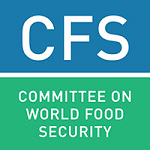Committee on World Food Security

The Committee on World Food Security (CFS) was established in 1974 as an intergovernmental body to serve as a forum in the United Nations System for review and follow-up of policies concerning world food security including production and physical and economic access to food.
The committee's tasks are to:
- Coordinate a global approach to food security
- Promote policy convergence
- Support and advise countries and regions
- Coordinate at national and regional levels
- Promote accountability and share best practices
- Develop a global strategic framework for food security and nutrition
Structure
The CFS Bureau and Advisory Group
The Bureau is the executive arm of the CFS . It is made up of a Chairperson and twelve member countries. The current Chairperson is Thanawat Tiensin of the Kingdom of Thailand. The Advisory group is made up of representatives from the 5 different categories of CFS Participants. These are:
1 UN agencies and other UN bodies;
2 Civil society and non-governmental organizations particularly organizations representing smallholder family farmers, fisherfolks, herders, landless, urban poor, agricultural and food workers, women, youth, consumers and indigenous people;
3 International agricultural research institutions;
4 International and regional financial institutions such as the World Bank, the International Monetary Fund, regional development banks and the World Trade Organization;
5 Private sector associations and philanthropic foundations.
Plenary
The Plenary session is held annually and is the central body for decision-taking, debate, coordination, lesson-learning and convergence by all stakeholders at a global level on food security issues.
The High Level Panel of Experts (HLPE)
The High Level Panel of Experts on Food Security and Nutrition (HLPE) was established in 2010 as the science-policy interface of the UN Committee on World Food Security (CFS). The HLPE aims to improve the robustness of policy making by providing independent, evidence-based analysis and advice at the request of CFS.
The HLPE has two components. The first is a steering committee made up of internationally recognized experts in a variety of food security and nutrition-related fields. The second is a roster of experts which is used to build teams that act on a project -specific basis to analyze and report on issues related to food security and nutrition.
The goal of the HLPE is to ensure the regular inclusion of advice based on scientific evidence and knowledge. As directed by the CFS Plenary and Bureau, the HLPE will assess and analyze the current state of food security and nutrition and its underlying causes. It will also provide scientific and knowledge-based analysis and advice on policy-relevant issues and identify emerging trends. It will also help prioritize future actions and focus attention on key focal areas.
Until today (2019) the HLPE has published 14 reports:
- Price volatility and food security (2011)
- Land tenure and international investments in agriculture (2011)
- Food security and climate change (2012)
- Social protection for food security (2012)
- Biofuels and food security (2013)
- Investing in smallholder agriculture for food security (2013)
- Sustainable fisheries and aquaculture for food security and nutrition (2014)
- Food losses and waste in the context of sustainable food systems (2014)
- Water for food security and nutrition (2015)
- Sustainable agricultural development for food security and nutrition: what roles for livestock? (2016)
- Sustainable forestry for food security and nutrition (2017)
- Nutrition and food systems (2017)
- Multi-stakeholder partnerships to finance and improve food security and nutrition in the framework of the 2030 Agenda (2018)
- Agroecological and other innovative approaches for sustainable agriculture and food systems that enhance food security and nutrition (2019)
The Secretariat
The CFS has a permanent Secretariat located in Food and Agriculture Organization of the United Nations (FAO) headquarters in Rome, Italy which includes members from the World Food Programme (WFP) and the International Fund for Agricultural Development (IFAD). Its task is to support the Plenary, the Bureau and Advisory Group and the HLPE in their work.
